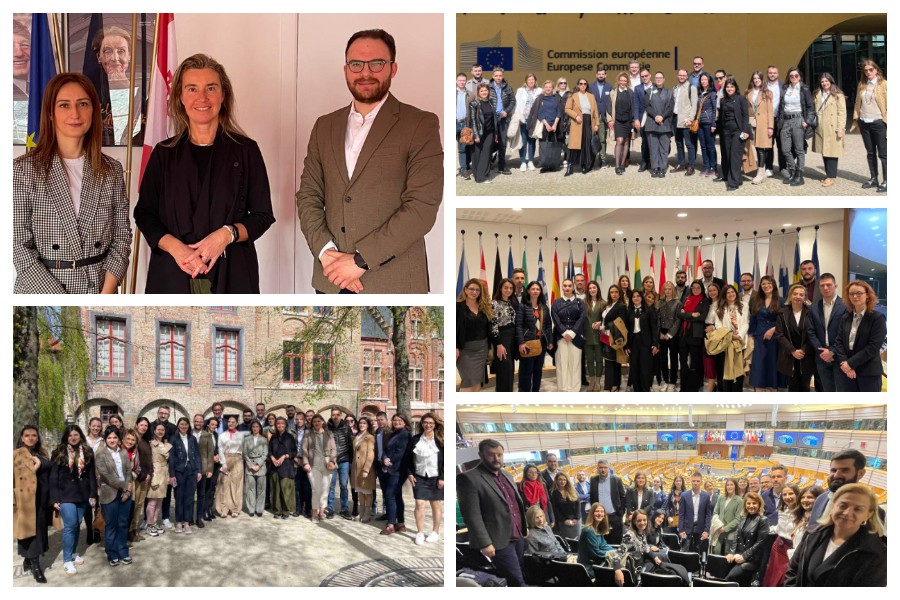
Regional Mobility Programme: Transformative Experience for 25 Public Servants Who Completed Executive Education at the College of Europe and Study Visit to the EU Institutions
8-12 April 2024, Brugge and Brussel, Belgium
As an integral component of the Western Balkans Regional Mobility Programme, meticulously crafted in collaboration with the College of Europe, various EC institutions, and lectures from EU Member States, ReSPA successfully executed an Executive Training in Governance Development and Advanced Leadership Programme and study visit to various EC institutions.
The inaugural segment of the programme featured a rigorous 3-day Executive Training conducted at the College of Europe in Brugge. This segment gave participants an immersive learning experience, diverse skill development opportunities, and invaluable networking prospects.
Renowned lecturers such as Piotr MACIEJ KACZYNSKI, Ljiljana SIMIĆ, Anne VITREY, and Florent MARCIACQ guided them through EU Integration and policy implementation, Regional Cooperation and geopolitical context, public administration and governance reforms, EU Strategic Policy Development and EU Financial Management and Budget Analysis.
Participants had a great opportunity to meet and discuss with Federica MOGHERINI, Rector of the College of Europe, who updated on the opening of the Tirana campus and stressed the crucial importance of building human capital for accession reforms, including through such capacity-building and networking activities. The Rector highlighted the positive shift in the EU, with the enlargement being seen as a strong investment in the EU and the Enlargement Agenda becoming more credible.
In a bilateral meeting with Mogherini, Director HANDJISKA-TRENDAFILOVA delved into tangible avenues for longer-term and structured cooperation in executive learning for the dedicated civil servants in Western Balkans. Handjiska-Trendafilova highlighted the Tirana Campus as a pivotal hub for expertise in SEE and EU matters, underlining the importance of collaborations that integrate the direct perspectives of public sector practitioners into the learning process and that leverage the extensive knowledge as the one that the College of Europe will foster in our region: “Strong human capital, that is knowledgeable, skilled, motivated, empowered, well-connected - is a precondition for advancing the accession and for the next generation of EU policy-makers”.
The program's second phase entailed a comprehensive study visit to the European Commission's Directorate General for Neighbourhood and Enlargement Negotiations (DG NEAR), the European Parliament, the European Committee of the Regions, the European External Action Service, as well as Embassies of Montenegro and North Macedonia to the EU.
Giulio VENNERI, Team Leader and Sandra LAQUELLE, Policy Officer on PAR and Economic governance from DG NEAR (European Commission) provided invaluable insights into the significance of the fundamentals of the accession process: rule of law, democracy, and public administration reform. They emphasized the EC's strong commitment to expediting the accession process.
At the European Parliament, participants engaged in discussions with Robertas POGORELIS, the Desk Officers of the Western Balkans Division, and representatives of the Committee on Foreign Affairs. Topics of interest included the Parliament's role in the Enlargement process, the relationship between the EP and the parliaments of the Western Balkans, and the upcoming June elections in the EU.
The crucial role of regional and local authorities in implementing EU-funded programs and projects was a focal point of discussions at the European Committee of the Regions. Policy Officer Marinko RAOS underscored the necessity of robust local authorities, highlighting that 70% of the acquis is implemented at the local level, with EU funds predominantly utilized by regional and local authorities.
A stimulating dialogue occurred at the European External Action Service with Clive RUMBOLD, a senior official in the Western Balkans Division, and the WBs Task Force team. Mr. Rumbold emphasized that the evolving geopolitical landscape in Europe presents a new window of opportunity for the Western Balkans, with EU Member States leaders the region’s accession a critical priority.
Participants seized the welcomed opportunity to meet and exchange with the Ambassadors of the Montenegro and North Macedonia Missions to the EU, Petar Markovic and Zulfi Ismaili, respectively. They discussed various facets of the enlargement momentum in the Western Balkans and the important roles of the Missions.
The next phase of the program entails a unique opportunity for the civil servants to do job shadowing in during May and June in ReSPA, Regional Cooperation Council (RCC), Center of Excellence in Finance (CEF), Central European Free Trade Agreement (CEFTA), Regional Anticorruption Initiative (RAI), Regional Youth Cooperation Office (RYCO), Western Balkans Fund (WBF), Western Balkans 6 Chamber Investment Forum (WB6).



